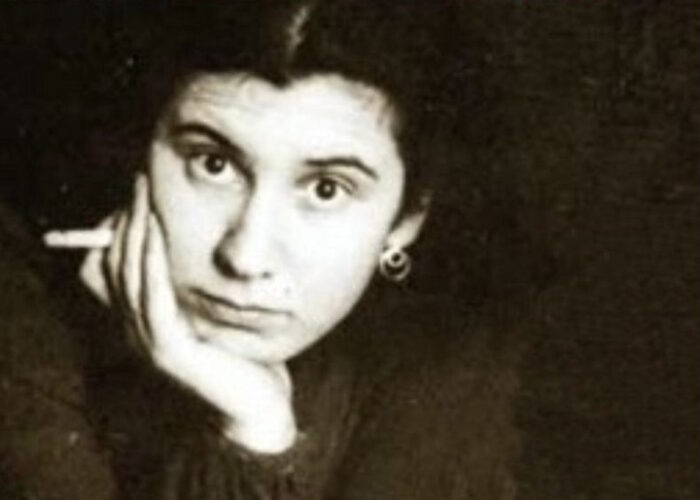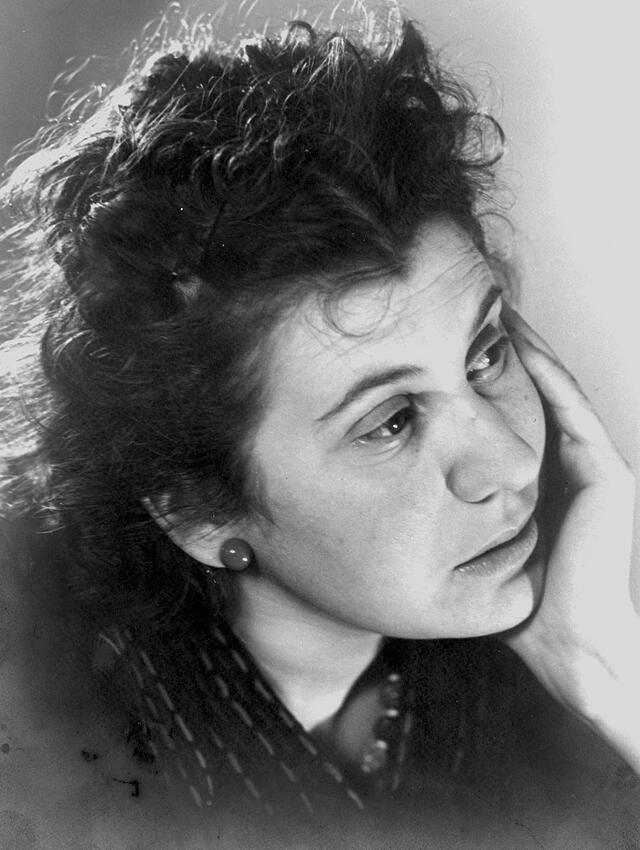Ought we not, from time to time, open ourselves
to cosmic sadness?
…
She was young, only 27, with faraway eyes,
clear, and penetrating.
A Dutch Jew, with something of the early Christian about her.
Yet neither conventionally Christian nor typically Jewish.
She followed her own spiritual rhythm,
not inspired by church or synagogue,
dogma or doctrine:
When I pray I hold a silly, naive or deadly serious dialogue
with what is deepest inside me, which for convenience’ sake,
I call God.
…
Give your sorrow
all the space and shelter in yourself that is its due.
Slowly, they removed her streets, her paths, her beloved stretches
of translucent sky, her trees—that bowed down under the weight
of the fruit of the stars—then her bicycle,
then her friends, then her family.
But if you do not build a decent shelter for your sorrow,
and instead reserve most of the space inside you for
hatred and thoughts of revenge—
from which new sorrows will be born for others—
then sorrow will never cease in this world
and will multiply.
When the train car pulled away from Westerbork,
toward Auschwitz, she flung out a note, later recovered:
The Lord is my high tower…
We left the camp singing…
…
I hate nobody, I am not embittered,
and once the love of mankind has germinated in you,
it will grow without measure.
…
Entering into Etty Hillesum’s diary is to step into
the evocative bodily fullness of life, to sink into the deep peace
between two breaths; into a deeper, radiant reality—
to taste of the way the world could be.
And if you have given the sorrow the space its gentle origins demand
then you may truly say,
life is beautiful and so rich, so beautiful and so rich
that it makes you want to believe in God.
…
This morning I am again thinking of Etty—how unsuited
she was to this world. How irreconcilable her soul,
how foreign her spirit is to the genocidal powers of this world.
At night, as I lay in the camp on my plank bed,
I was sometimes filled with an infinite tenderness and I prayed,
‘Let me be the thinking heart of these barracks.’
That is what I want to be.
The thinking heart of a whole concentration camp.
This thought is mine: how grieved—doubly grieved—
she would be, to see the Jewish nation-state, its current leaders,
this many years later, so efficient an oppressor.
Something else about this morning: the perception, very strongly borne in,
that despite all the suffering and injustice I cannot hate others.
All the appalling things that happen are no mysterious threats from afar,
but arise from fellow beings very close to us.
The terrifying thing is that systems grow too big for men
and hold them in a satanic grip,
the builders no less than the victims of the system,
much as large edifices and spires, created by men’s hands,
tower high above us, dominate us,
yet may collapse over our heads and bury us.
…
Many would call me an unrealistic fool
if they so much as suspected what I feel and think.
And yet there exists in me all the reality
the day can bring.
Where did it come from, her ability
to open herself to the cosmic sadness of the world—
such radical, undaunted empathy—
that allowed this kind of love to enter, grow, and stay with her?
And can a fraction happen in us?
…



Oh, this one hits with impact.
Thank you, Diane. Her diary is bracing and beautiful.
Stephen – this a timely post for me, here at 4:30 a.m. and sleepless. It filled me with hope and sorrow all at once. –“radical, undaunted empathy”– Etty was very much in the world but not of the world. I think of Victor Frankl’s Man’s Search for Meaning. I think of Etty’s being “the thinking heart of the barracks”. The deep breath inward then slowly out, when we feel sorrow and hope all at once, and it takes our hand and leads us into the day. Blessings to you for “Growing Mercy”. Thank you for introducing Etty.
And thank you, Diana, for this response. I stumbled upon her diary, and found myself in the presence of a revolutionary, evolutionary, soul. Impossible not to change how I viewed my day.
This is the paradoxical and pure power of light that holds back the darkness. Thank you for giving us a glimpse, Stephen.
Excellent observation an description, thank you, Dan! There’s an abundance of that light in her diary.
Thank you for recommending this diary, Stephen.
You’re welcome, Marcia.
in short
I am gutted by this
mired in all that is beauty and
horror
in these words, in these thoughts
and indeed… in this world
often I wonder just how,
one could possibly survive
the very cruelties and ever persistent
hopefulness
of a ‘thinking heart’
So very beautiful to receive this Stephen,
thank you so much for this introduction to Etty Hillesum -^-
Thank you, Tamara, for this thoughtful, heartfelt response.
“Cosmic sadness” – when we stop fleeing from it, we are able to enter the “fellowship of suffering” (Phil. 3:10) in which we can know and be known (1 Cor. 13). But when we seek to escape it, we engage in “fights and quarrels” (James 4).
Thanks for this one, Steve.
And thank you, Sam. That phrase, the “fellowship of suffering” seems a profoundly mysterious thing, yet something we all, are inevitably called to.
I do pray for a fraction of her radical empathy! I feel this cosmic sadness and I have built a shelter for it but perhaps that sadness has taken too much space. How do we build a proper shelter such that the cosmic sadness does not swallow us? How do we also plan resistance and liberation while maintaining empathy for the oppressors? We must also build a shelter for our anger so that it does not overtake us but aids us in the pursuit of justice. We do not need to dwell on revenge but we do need to dream of a path forward to equity and accountability. True reconciliation and healing cannot happen until ownership of evil is taken and active change has begun. We can love our oppressors, but in love for ourselves and the oppressed we must also resist evil in practice, in worldly action.
So well said, Osian. As well, those are important questions. Thank you for adding an important dimension to this post.
Technical problems delayed my response to “the thinking heart”. Embarrassing symbolism.
Ha! Thanks Ike.